SEO Tools: Top Platforms Compared
Discover which SEO tools for 2025 stand out in features, value, and user reviews. Which platform will give agencies and marketers the winning edge?

Amid ongoing advances in digital marketing, SEO professionals, agencies, and business owners face an evolving landscape. Powerful search engine optimization tools have become indispensable for achieving measurable results in 2025, impacting everything from rankings to reporting.
Brands like Indexly are equipping their audiences—SEO professionals, digital marketing agencies, business owners, webmasters, and affiliate marketers—with solutions to keep pace with continuous changes. Understanding why and how these tools are critical sets the stage for effective, competitive online strategies.
Challenges for SEO Professionals, Agencies, and Business Owners
The dynamic nature of SEO means professionals must navigate heightened competition and adapt to new best practices regularly. With a crowded digital marketplace, standing out becomes increasingly complex, necessitating innovative approaches to keyword research, technical SEO, and audience targeting.
Handling technical SEO, robust content optimization, and continuous performance tracking demands both expertise and reliable technology. Time spent manually analyzing site health or performance metrics can limit strategic focus and slow response times. Using comprehensive SEO software allows teams to efficiently pinpoint areas for improvement, streamline workflows, and stay ahead of competitors.
Choosing the Best SEO Tools & Comparisons for 2025
Choosing the right SEO solution in 2025 requires familiarity with emerging technologies and an understanding of how software supports business goals.
At Indexly, our audience of SEO professionals, digital marketing agencies, business owners, webmasters, and affiliate marketers are increasingly seeking tools that go beyond traditional analytics and reporting, while offering simple yet powerful functionalities.
Let’s break down what makes a tool stand out, explore the importance of comparisons, and identify who should be prioritizing top-tier SEO software moving forward.
What Makes a Tool the 'Best' for SEO in 2025?
To be recognized as the best in 2025, an SEO tool must combine innovative features with reliable analytics. The rapid adoption of AI, automation, and integration capabilities separates advanced platforms from those struggling to keep pace. Practicality, data clarity, and accessibility are now crucial benchmarks.
Features
- State-of-the-art AI-powered keyword and content analysis
- Automated site audits and reporting systems
- Integrations with major marketing, analytics, and workflow platforms
- Intuitive dashboards with customizable modules
Pros
- Boosts productivity and accuracy for SEO campaigns
- Simplifies collaboration between teams and clients
- Delivers in-depth, real-time data insights
Cons
- Complex features may require onboarding for new users
- Advanced functionalities can come with higher subscription costs
Let us get started!
1. SEMrush
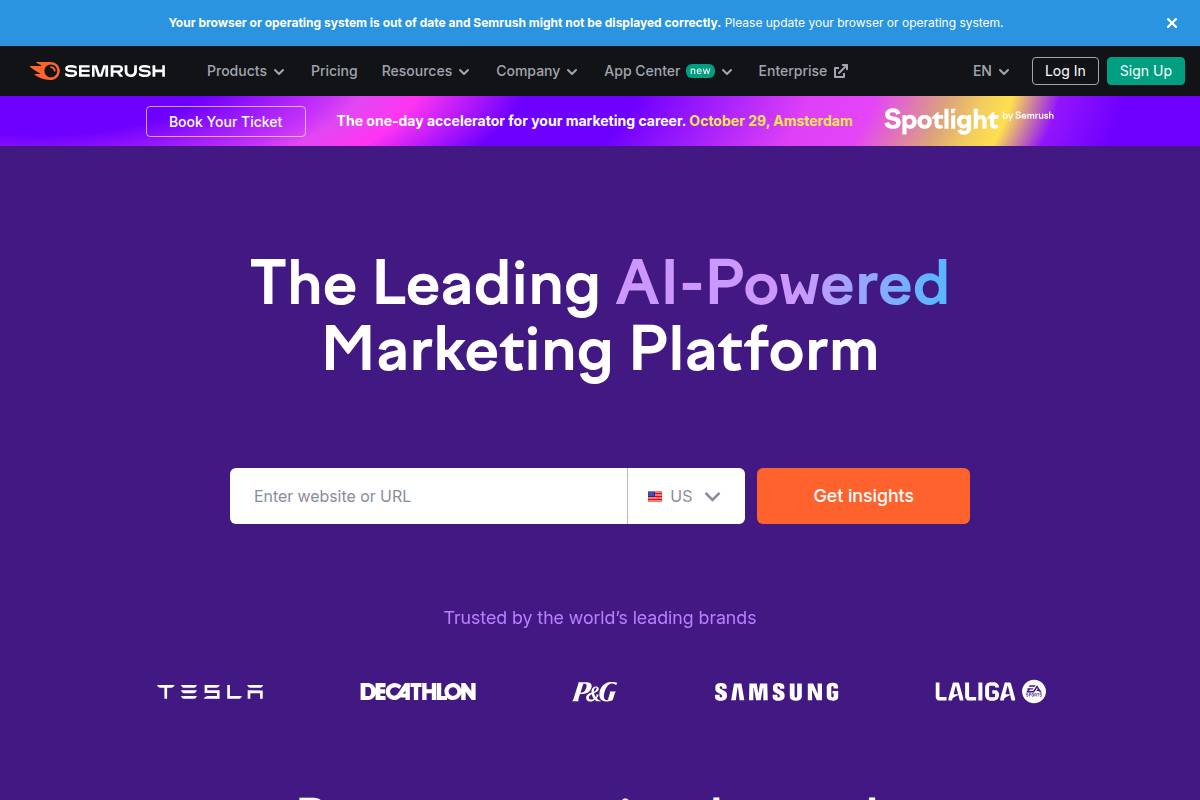
SEMrush is a leading all-in-one digital marketing suite designed for SEO professionals, digital marketing agencies, business owners, webmasters, and affiliate marketers. The tool helps users conduct keyword research, track rankings, perform comprehensive competitor analysis, and manage online visibility effectively. Its robust capabilities make it a staple in the strategic planning of digital marketing campaigns and organic growth efforts. Let’s explore SEMrush in-depth, covering its technical requirements, advantages, comparison with other platforms, and practical applications.
About
SEMrush was launched in 2008 and has evolved into an industry-recognized SaaS platform for search engine optimization and digital marketing. The tool supports users in boosting website traffic and optimizing for search engines by streamlining research and reporting tasks.
SEO professionals, agencies, and businesses use SEMrush to gain actionable insights, track competitor performance, and develop data-driven strategies.
Technical Requirements
To use SEMrush efficiently, users only need a stable internet connection and a modern web browser. The platform is cloud-based, so no installation or high-end hardware is required, making it accessible for remote teams and agencies.
Integration options are available with third-party tools such as Google Analytics and Google Search Console, which enhances workflow productivity and reporting accuracy.
How It Compares to Other Tools
SEMrush stands out against competitors like Ahrefs and Moz due to its extensive database and diverse toolkit for SEO, PPC, and content marketing. While some tools may offer deeper backlink analysis or unique keyword databases, SEMrush excels with its unified dashboard and frequent database updates.
Its competitive intelligence features and market research tools make it a preferred choice for agencies handling multi-faceted campaigns.
Getting Started Tips
First-time SEMrush users should begin with the website audit and keyword overview tools to establish a performance baseline. Set up project dashboards to track target domains, assign keyword lists, and schedule regular site audits.
Employ the Topic Research and Position Tracking features for actionable insights and informed decision-making, ensuring a smooth onboarding experience.
Key Features
- Comprehensive keyword research with search volume and trends.
- Competitor domain analysis to uncover strengths and weaknesses.
- Technical SEO site audits to identify optimization opportunities.
- Backlink auditing and monitoring with toxicity scoring.
- Content marketing toolkit for topic discovery and optimization.
- PPC research tools for paid advertising strategies.
- Social media management for publishing and analytics.
Pros
- User-friendly interface suitable for both beginners and advanced users.
- Extensive and frequently updated keyword and competitor database.
- Robust reporting and visualization features for client communications.
- Integrates seamlessly with Google tools and other marketing platforms.
Cons
- Pricing plans may be cost-prohibitive for small businesses and solo entrepreneurs.
- Certain features, such as historical data, are restricted to higher-tier subscriptions.
- Steep learning curve for those not familiar with SEO tools.
Pricing
SEMrush offers tiered pricing plans to cater to different business needs, including Pro, Guru, and Business subscriptions. Each plan varies based on user seats, project capacities, API access, and advanced features. Agencies and enterprises can opt for custom solutions, and a free trial is available for users to explore core functionalities before committing.
User Sentiment
SEMrush is largely praised by SEO professionals and agencies for its actionable reports and exhaustive data coverage. Business owners and affiliate marketers echo positive feedback on its project management features and competitive analytics. While some users mention the pricing hurdle, many view the investment as justified by the platform’s impact on campaign performance and ROI, as highlighted in independent case studies and user testimonials.
Further Read: https://www.semrush.com/
2. Ahrefs
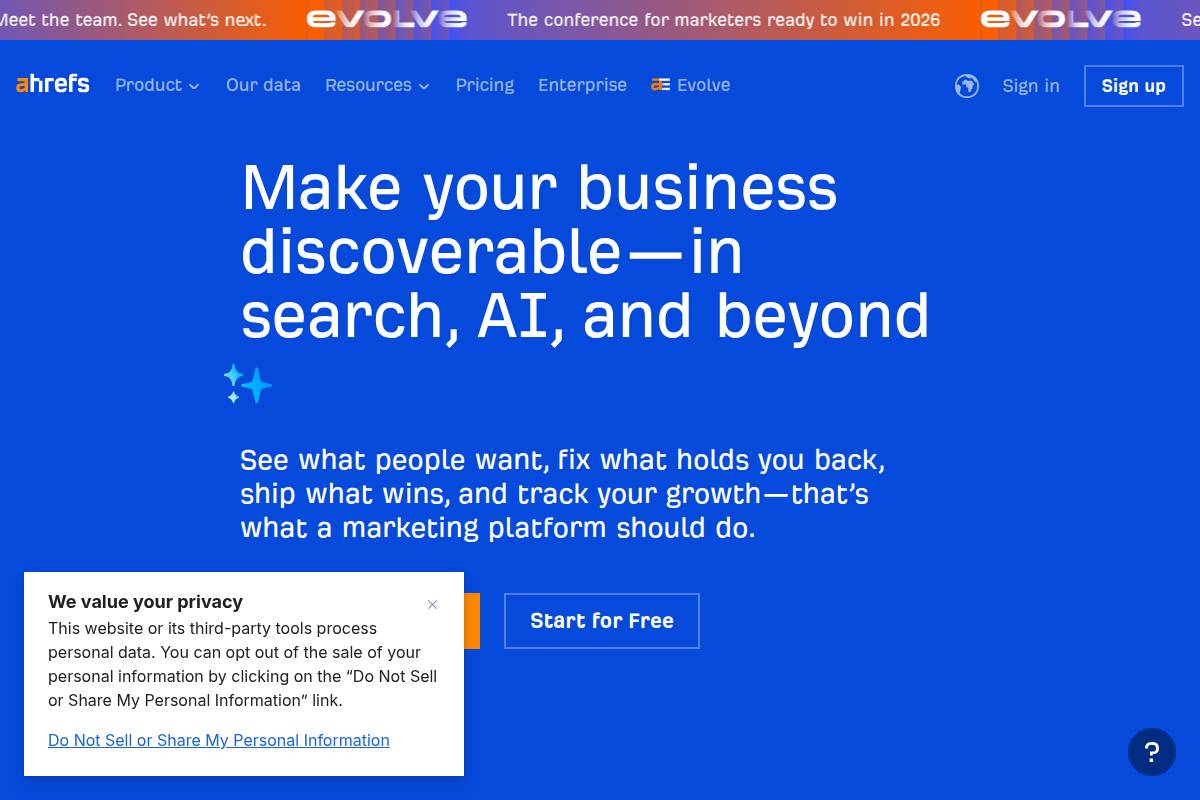
Ahrefs is a leading SEO tool widely used by professionals, agencies, and businesses looking to improve their online presence. For the Indexly audience—which includes SEO professionals, digital marketing agencies, business owners, webmasters, and affiliate marketers—Ahrefs provides solid solutions for keyword research, backlink analysis, and competitor insights. Whether managing small projects or large-scale campaigns, its robust data and actionable metrics enhance visibility strategies across various industries.
About
Ahrefs is a comprehensive SEO platform that specializes in site auditing, keyword analysis, content research, and competitive analysis. Established in 2011, it has become a staple in the digital marketing toolkit due to its extensive data index and user-friendly interface. Businesses and individual marketers rely on Ahrefs to uncover ranking opportunities and monitor website health efficiently.
Technical Requirements
Ahrefs is a web-based service, requiring only a modern internet browser and a stable connection. Users need to create an account to access full features, and no additional software installation is necessary. Its cloud infrastructure ensures data is always accessible and up-to-date, making it suitable for teams and agencies working remotely or managing multiple projects simultaneously.
How It Compares to Other Tools
Compared to other SEO tools, Ahrefs is recognized for its highly accurate backlink database and intuitive interface. While competing platforms like SEMrush and Moz offer overlapping functionalities, Ahrefs stands out with its vast keyword index and consistently updated crawling technology. Users often cite more actionable insights and faster updates as distinct advantages over competitors.
Getting Started Tips
To get started, sign up for an Ahrefs account and connect your website. Begin by running a Site Audit to identify technical issues, then use Site Explorer for backlink analysis. Explore Keyword Explorer to identify topics with ranking potential. Scheduling regular reports and leveraging alerts help users stay ahead of competitors and track ongoing performance.
Key Features
- Site Explorer: Comprehensive backlink profiling for any domain or URL.
- Keyword Explorer: Detailed keyword metrics, suggesting related opportunities in major search engines.
- Site Audit: Automated technical SEO audits to uncover site issues and offer improvement suggestions.
- Content Explorer: Discover high-performing content and research trending topics in your niche.
- Rank Tracker: Monitor keyword rankings and performance metrics across different regions.
Pros
- Extensive backlink database updated frequently.
- Intuitive, easy-to-navigate interface suitable for beginners and experts.
- Reliable and actionable data for competitive analysis and strategy refinement.
Cons
- Pricing may be prohibitive for small businesses or freelancers.
- Some advanced features require a learning curve for new users.
- Historical data is limited on lower-tier plans.
Pricing
Ahrefs offers various pricing tiers to accommodate solo marketers, agencies, and enterprises. Plans range from basic access suitable for individuals to advanced subscriptions for agencies handling multiple projects. All tiers provide essential SEO tools, but advanced reporting and API integrations are reserved for higher levels. Free trials are occasionally available, allowing users to test features before committing.
User Sentiment
Ahrefs is generally well-regarded by SEO professionals and agencies for its data accuracy and usability. Many users highlight the platform’s ability to uncover untapped opportunities and simplify tasks like backlink monitoring and competitor tracking. Case studies from webmasters underline its impact on boosting search visibility and organic growth, particularly when used consistently in strategy development.
Further Read: https://ahrefs.com/
3. Moz Pro
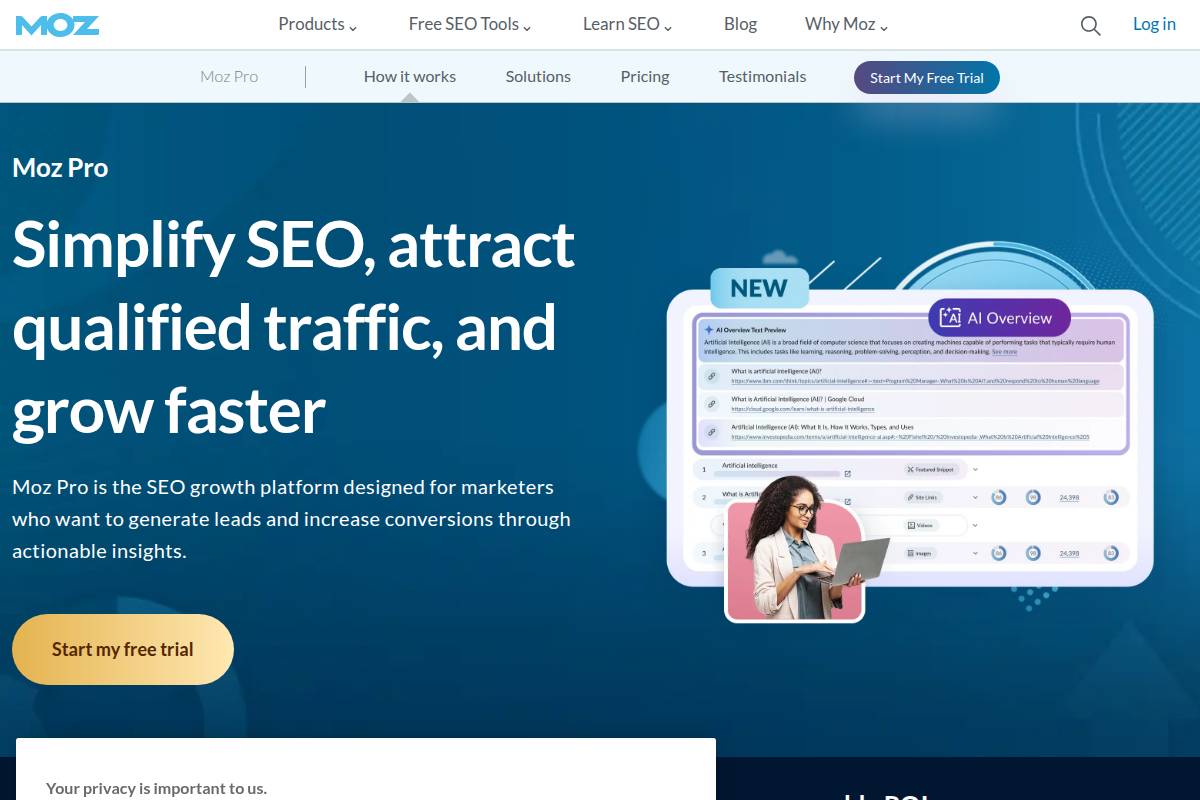
Moz Pro is a robust SEO toolset widely utilized by SEO professionals, digital marketing agencies, business owners, webmasters, and affiliate marketers in the United States. It offers a comprehensive suite of features aimed at improving search engine visibility and driving organic traffic. This section delves into Moz Pro's essentials, including technical requirements, feature comparisons, onboarding tips, its capabilities, user perspectives, and real-world applications relevant to the Indexly audience.
About
Moz Pro was developed to simplify complex SEO workflows through an intuitive interface and data-driven analytics. The tool integrates keyword research, site audits, backlink analysis, and rank tracking, allowing users to manage their SEO strategy from a single dashboard. Over the years, Moz Pro has become a trusted platform for monitoring websites, and optimizing online performance for diverse business objectives.
Technical Requirements
To use Moz Pro, you need a modern web browser and an active internet connection. It is a cloud-based solution, meaning no heavy installations are required, and it works across operating systems. Users may need to verify site ownership and, for the most seamless experience, disable ad-blocking extensions while performing deep analyses.
How It Compares to Other Tools
Moz Pro stands out for its user-friendly designs and actionable metrics, but it faces competition from platforms like SEMrush and Ahrefs. Compared to these, Moz Pro is known for its clear interface and community support, though some advanced users may desire more granular backlink data or technical audit detail. Agency teams often use Moz Pro alongside other SEO tools for complementary insights.
Getting Started Tips
Start by identifying key SEO goals for your site, then use Moz Pro's site audit to uncover optimization opportunities. Next, leverage keyword explorer for targeted research and set up campaign tracking. For business owners new to advanced SEO, Moz’s resource library and onboarding guides are helpful, making setup efficient and actionable.
Key Features
- Keyword Explorer for in-depth keyword analysis
- Comprehensive site audit and crawl diagnostics
- Rank tracking for chosen keywords across search engines
- Backlink analysis and competitor link insights
- On-page optimization recommendations
Pros
- Intuitive and beginner-friendly interface
- Comprehensive keyword and site analysis tools
- Helpful onboarding and community support resources
- Regular product updates based on user suggestions
Cons
- Limited backlink database compared to some competitors
- Can be costly for small businesses or solo users
- Advanced users may find some data less granular
Pricing
Moz Pro offers tiered subscription plans suited for various business sizes and needs. Entry-level plans are designed for small businesses or individuals with basic needs, while higher tiers add enhanced data limits, reporting options, and user seats. Flexible monthly and annual billing options are available, helping agencies scale affordably.
User Sentiment
Most users appreciate Moz Pro's focus on usability and educational resources, reporting a positive experience for campaign tracking and optimization. Some case studies highlight digital marketing agencies improving client site rankings with Moz’s keyword research and audit tools, though advanced SEO specialists occasionally wish for deeper technical insights.
Further Read: https://moz.com/products/pro
4. Indexly
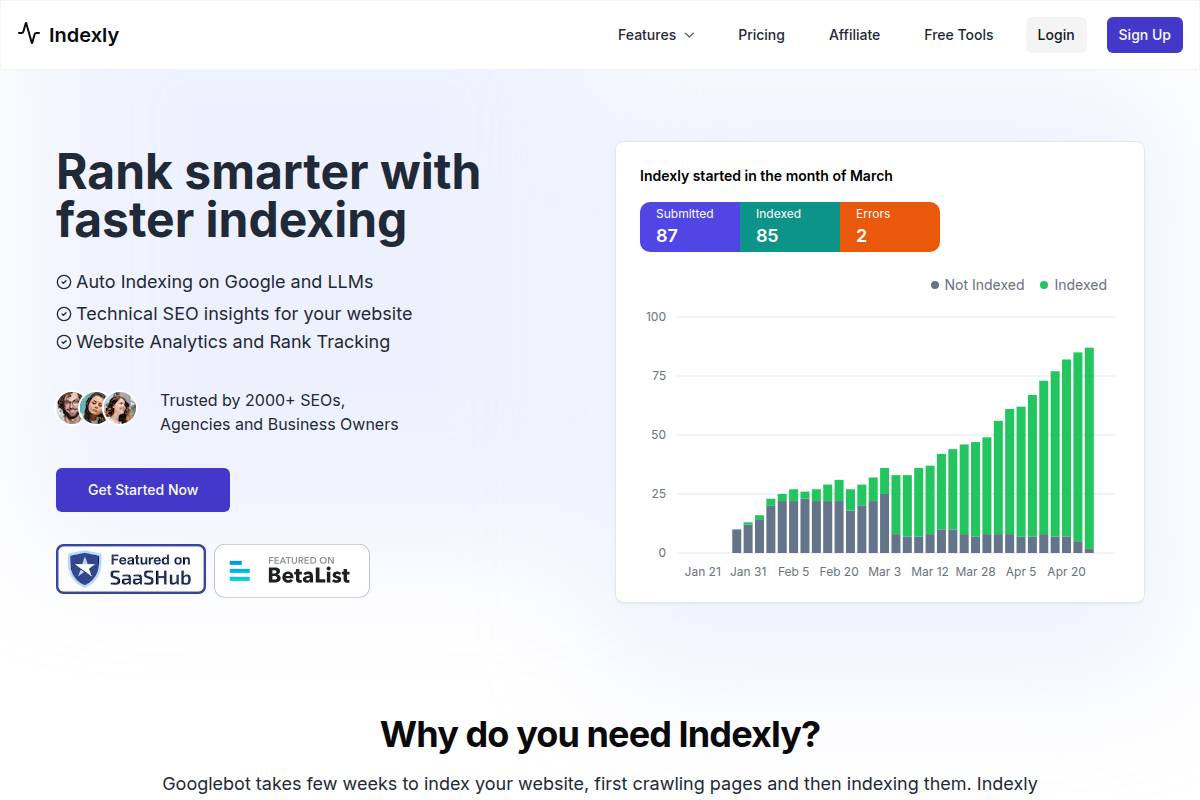
For SEO professionals, digital marketing agencies, business owners, webmasters, and affiliate marketers, efficient website indexing can significantly influence online visibility. Indexly serves as a comprehensive tool designed to streamline and advance web indexing strategies, helping websites secure better search engine rankings and improved discoverability.
About
Indexly is a specialized online platform that automates the process of submitting URLs to search engine indexes. It caters to users who require systematic and reliable indexing of new or updated pages to enhance organic performance. Its focus on seamless integration makes it popular among businesses looking to maximize their SEO efforts efficiently.
Technical Requirements
Before implementing Indexly, users should ensure they have access to their website's backend and can generate API keys if necessary. Most commonly, Indexly requires integration via API or plugin, making it compatible with major content management systems (CMS). Proper user authentication and current hosting environments speed up setup and ongoing use.
How It Compares to Other Tools
Indexly differentiates itself from competitors with its automation efficiencies and compatibility across multiple platforms. While similar tools might focus on a select few engines, Indexly enables multi-engine submissions and more granular control. Case studies from agencies indicate reduced manual workload and faster indexing results compared to alternatives.
Getting Started Tips
To begin, sign up for an Indexly account and connect your website via API or available plugins. Next, designate which URLs or sitemaps you wish to index and schedule automated submissions. Monitor indexing reports within the dashboard to track effectiveness and adjust submission frequencies as needed for optimal performance.
Key Features
- Automated URL and sitemap submissions across multiple search engines
- Real-time indexing status updates and detailed analytics dashboard
- Flexible API integration compatible with major CMS platforms
- Bulk processing capabilities for large-scale websites
- Custom submission scheduling to align with content strategies
Pros
- Reduces manual effort and streamlines the indexing process
- Supports multiple domains and bulk URL submissions
- Provides actionable analytics for strategic SEO improvements
Cons
- Requires technical understanding for advanced integrations
- May have a learning curve for non-technical users
- Potential cost for premium features could be a concern for freelancers
Pricing
Indexly offers a tiered pricing structure, starting with a basic free trial and scaling up based on indexed URL volume and advanced features. Business owners and agencies often select mid to high-tier plans for enhanced analytics and priority support.
User Sentiment
Feedback from SEO professionals and digital marketers highlights Indexly's robust automation and reporting capabilities. Users report notable improvements in crawl rates, with agencies sharing case studies of faster content indexing and measurable SEO gains. Some users note the initial technical setup can be challenging, but overall satisfaction remains high due to tangible performance results.
Further Read: https://indexly.ai/
5. Screaming Frog SEO Spider
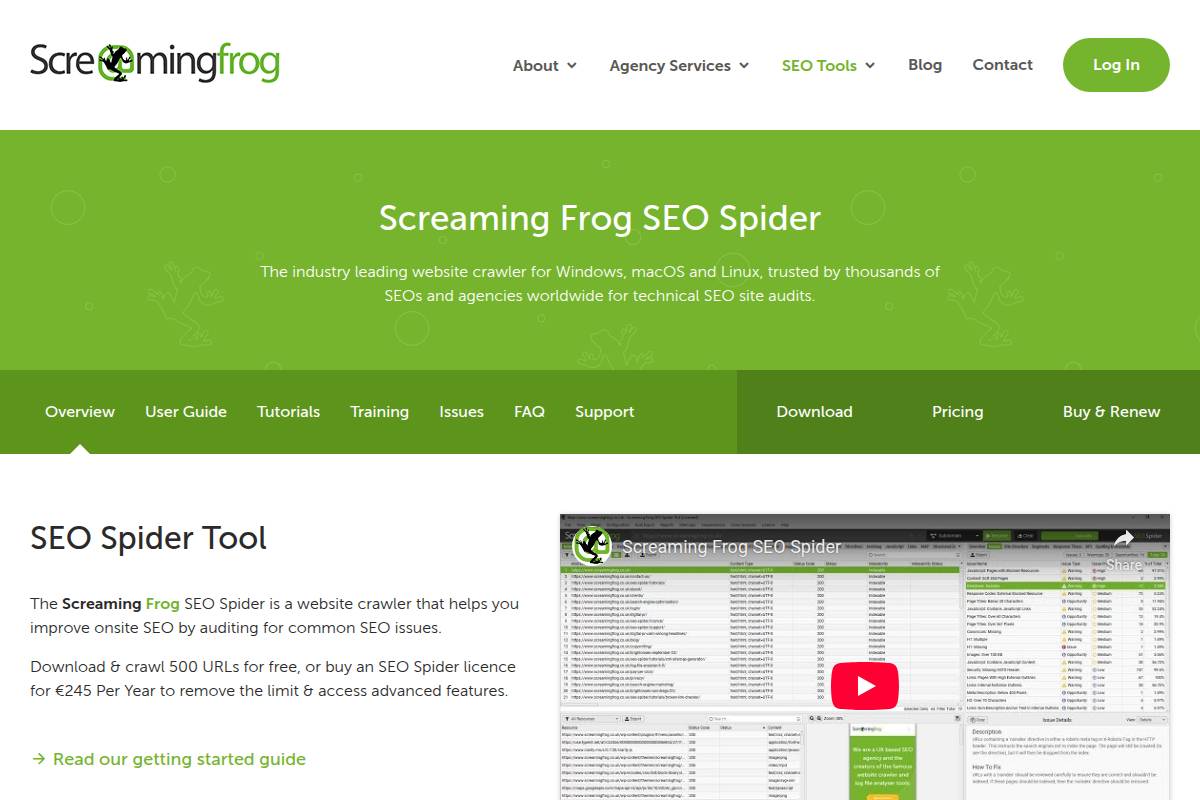
Screaming Frog SEO Spider is a robust desktop-based website crawler widely used by SEO professionals, marketing agencies, business owners, webmasters, and affiliate marketers in the United States. As a vital part of any technical SEO toolkit, it helps analyze website health, uncover issues, and discover optimization opportunities. This section explores the background, technical requirements, features, pros and cons, pricing, and user sentiment surrounding this popular tool, catering specifically to Indexly's diverse audience.
About
Screaming Frog SEO Spider is a software tool designed to efficiently crawl websites and collect data relevant to SEO. It enables users to audit site structure, identify broken links, uncover duplicate content, and analyze metadata. Its use is not limited to large enterprises; agencies and individual site owners also leverage its capabilities for detailed SEO audits.
Technical Requirements
The tool is available for Windows, macOS, and Ubuntu Linux, requiring a minimum of 2GB RAM (4GB recommended), and a multi-core processor for optimal performance. Larger crawls, especially for sites with tens of thousands of URLs, benefit from increased memory and SSD storage. No internet connection is required for basic crawling, but some advanced integrations may need network access.
How It Compares to Other Tools
Compared to SaaS solutions like Ahrefs or SEMrush, Screaming Frog offers more in-depth on-site crawling with customizable parameters and bulk export options. It requires more technical expertise but allows greater flexibility and local data processing. This makes it ideal for professionals who need granular control versus generalist all-in-one suites.
Getting Started Tips
Start by downloading the software from the official website and installing it on your machine. Enter your website's URL, adjust crawl settings based on site size, and initiate the crawl. Review crawl results in real-time, and utilize built-in filters to zoom in on common issues like missing meta tags or broken links. Save your project for future reference and comparison.
Key Features
- Comprehensive site auditing, including status codes, redirects, and canonical issues
- Custom crawl configurations and filters for targeted analysis
- Integration with Google Analytics, Search Console, and PageSpeed Insights
- Export functions for technical reports and CSV documentation
- Unlimited crawling for paid users, supporting large and complex sites
Pros
- Very detailed and customizable scanning for all technical SEO aspects
- One-time desktop license structure provides cost efficiency for agencies
- Regular updates and active user community
Cons
- Desktop installation may require additional system resources for large sites
- Steep learning curve for beginners with no prior SEO audit experience
- Some features require manual setup or advanced configurations
Pricing
Screaming Frog offers a free version, limited to crawling 500 URLs per website, which can be sufficient for small site audits. The paid license, priced annually, unlocks unlimited crawling, advanced features, and priority support, making it a competitive option for agencies and large businesses.
User Sentiment
SEO professionals and agencies frequently highlight the tool's reliability and depth, citing its extensive filtering and report options as major strengths. Newer users note the initial learning curve but generally appreciate the clear documentation and responsive support team. Case studies typically showcase Screaming Frog streamlining comprehensive site audits and driving actionable technical improvements for more effective search strategies.
Further Read: https://www.screamingfrog.co.uk/seo-spider/
6. SurferSEO
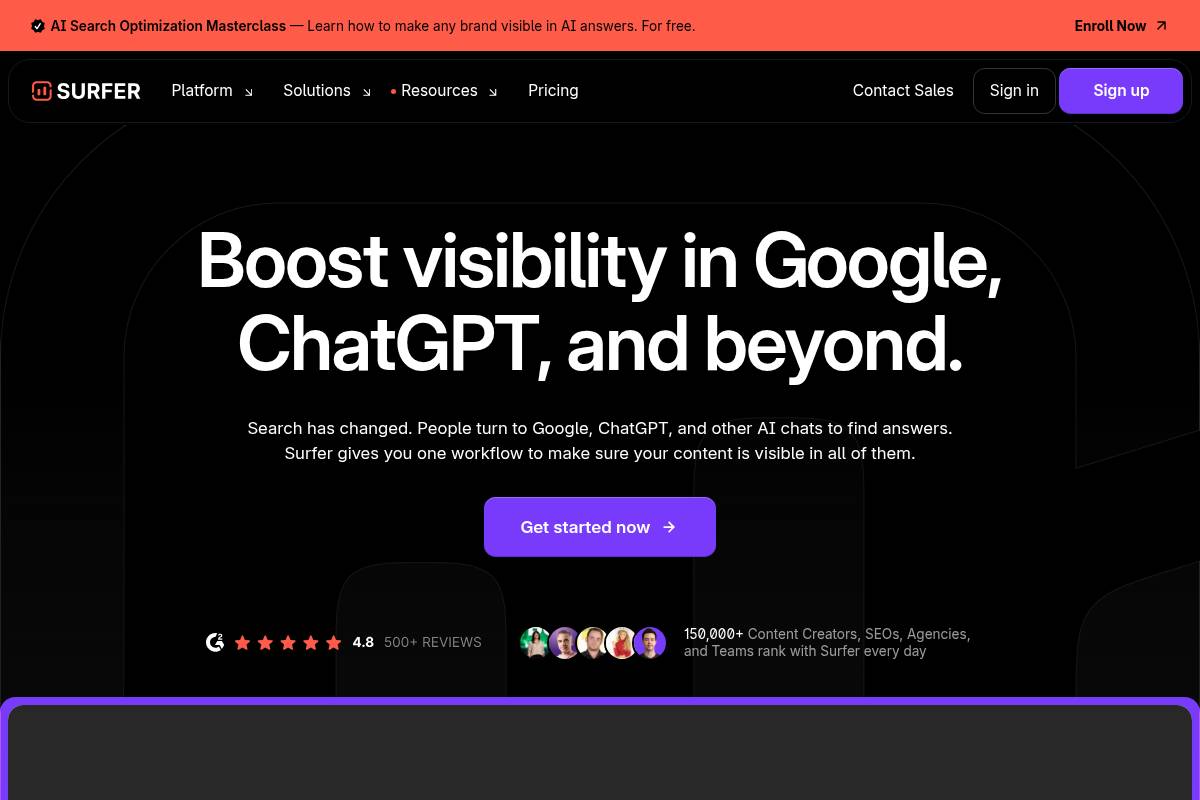
SurferSEO has become a popular solution among SEO professionals, digital marketing agencies, business owners, webmasters, and affiliate marketers aiming to optimize content for higher organic rankings. It focuses on data-driven optimization, allowing users to craft content built for discoverability and authority. Integrated features help users analyze competitors, optimize on-page factors, and boost site visibility with insights grounded in actionable metrics.
About
SurferSEO is a cloud-based platform providing a suite of tools for on-page SEO analysis and optimization. It serves users who want to improve their rankings through content adjustments based on data extracted from top-ranking pages. The tool integrates research, planning, and optimization steps, making it accessible for both individuals and teams managing multiple clients or websites.
Technical Requirements
To use SurferSEO, users simply need a modern web browser and a stable internet connection. No additional software installation is needed, but having access to the Chrome browser allows for extra functionalities via the official Chrome extension, which offers on-the-go SEO insights. The tool performs best on updated operating systems for seamless workflow and analysis speed.
How It Compares to Other Tools
SurferSEO competes with industry tools such as SEMrush, Ahrefs, and Clearscope by focusing primarily on on-page optimization. While other platforms might offer broader suites for keyword research, backlink analysis, or site audits, SurferSEO's data-driven content editor is often favored for its real-time adjustment suggestions. Businesses looking for in-depth on-page optimization find it a preferable option, although it is often used in combination with other SEO tools.
Getting Started Tips
Start by creating a SurferSEO account and familiarize yourself with the dashboard. Use the Content Editor for new articles or Audit Tool for existing pages by entering your target keyword and domain. Review the recommendations, make content updates directly using the tool’s editor, and track your improvements.
Key Features
- Content Editor for real-time SEO guidance and scoring
- Audit Tool for analyzing current on-page performance and spotting optimization gaps
- Keyword Surfer Chrome Extension for quick competitive and keyword insights
- SERP Analyzer for deep analysis of search pages and ranking factors
- Team collaboration features to assign tasks and monitor progress
Pros
- Comprehensive on-page optimization recommendations based on competitor analysis
- Actionable, data-driven suggestions for keyword usage, structure, and content length
- User-friendly interface suitable for beginners and experienced SEO professionals
Cons
- Limited backlink analytics compared to competitors like Ahrefs or SEMrush
- Learning curve for advanced functionalities
- Credits-based pricing can restrict usage for high-volume projects
Pricing
SurferSEO offers tiered plans to fit varying needs, from individuals to agencies. The entry-level plan caters to small teams, while premium plans unlock additional queries, audits, and features suitable for agencies managing multiple websites. Regular discounts are available, and a limited free trial helps evaluate the tool before commitment.
User Sentiment
Users appreciate SurferSEO for its direct impact on content optimization workflow and ranking improvements. Agencies have cited increased client satisfaction due to data-backed reports and recommendations. Some users mention a desire for more integrations and flexibility in usage caps, but the platform’s focus on usability and actionable analysis remains widely praised.
Further Read: https://surferseo.com/
7. SE Ranking
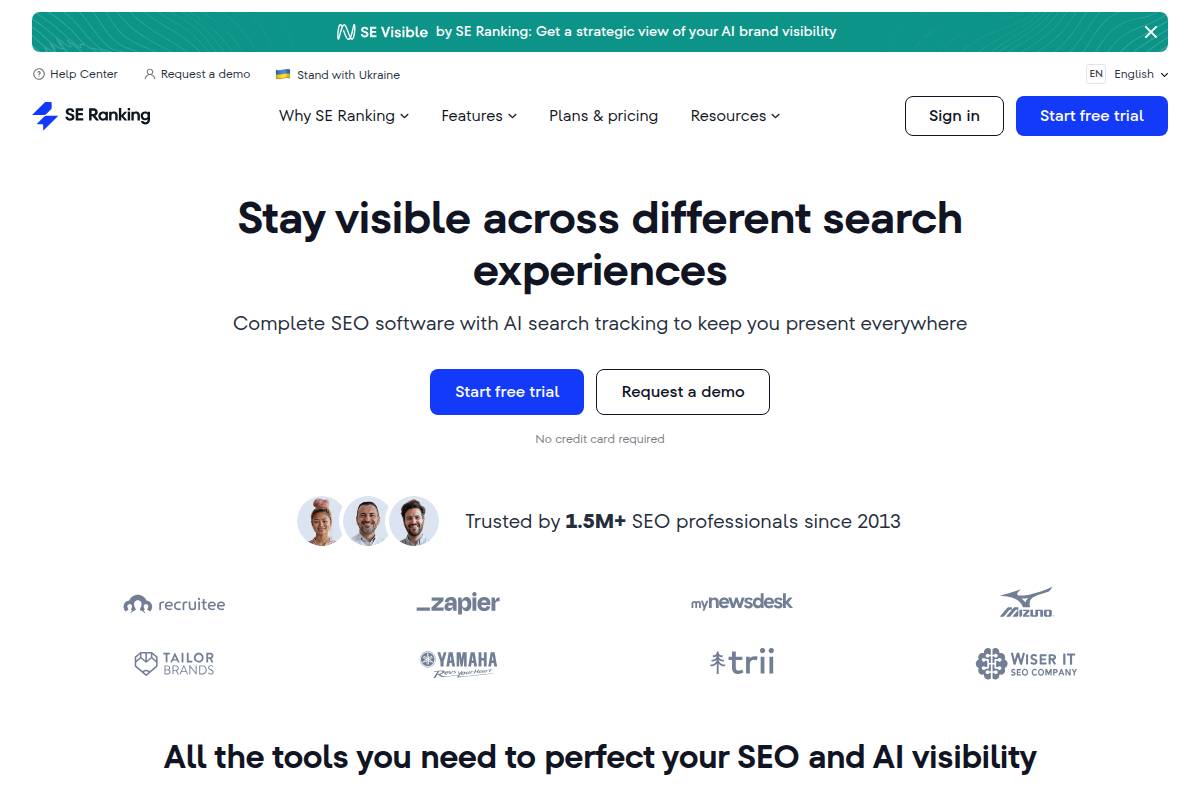
SE Ranking is a comprehensive SEO software suite favored by a variety of professionals, including SEO specialists, digital marketing agencies, business owners, and affiliate marketers. Popular among Indexly's audience in the United States, SE Ranking simplifies tasks like keyword rank tracking, website audits, backlink analysis, and competitor research. Its user-friendly interface and expansive feature set make it suitable for both novices and seasoned webmasters.
About
SE Ranking offers an all-in-one platform for managing and improving website SEO. Known for its accuracy and scalability, the tool adapts to different project sizes, making it ideal for freelancers, agencies, and larger businesses. Users appreciate its centralized dashboard that keeps complex data accessible and actionable.
Technical Requirements
Sign-up and implementation are straightforward—SE Ranking is a cloud-based platform, which means there's no software to install locally. Users simply need a web browser and an internet connection. The platform is compatible with all major browsers and does not require high-end hardware, ensuring ease of access for distributed teams.
How It Compares to Other Tools
Compared to established names like SEMrush and Ahrefs, SE Ranking offers similar functionalities at a more affordable rate. Its intuitive UI and customizable reporting are often highlighted as advantages. Several SEO agencies prefer SE Ranking for its reliable rank tracking and white-label options.
Getting Started Tips
Start by setting up your account and connecting your website. Next, use the website audit feature to identify critical SEO issues. Customize your keyword tracking, add competitor domains for comparison, and schedule automated reports to keep stakeholders informed. Consistent use ensures insight-driven improvements.
Key Features
- Precise keyword rank tracking across local, regional, and global markets
- Comprehensive on-page SEO audits and technical site checks
- Detailed backlink analysis and monitoring
- Competitor research and comparison tools
- White-label reporting capabilities suitable for agencies
Pros
- Affordable pricing models for a variety of user types
- Scalable features catering to both small businesses and large teams
- Robust support resources and responsive customer service
Cons
- Some advanced features may require a learning curve
- Limited integration with third-party analytics platforms compared to competitors
Pricing
SE Ranking provides flexible subscription plans based on the number of projects, keywords, and reporting frequency. Plans start affordably for individual users while custom plans are available for agencies. Monthly and annual billing options enable budget-friendly scaling as needs evolve.
User Sentiment
User reviews often mention the platform’s reliability and value for money. Case studies from agencies highlight improved reporting efficiency and actionable keyword data. Business owners appreciate the clarity of insights, which aid in making informed improvements to their digital strategies.
Further Read: https://seranking.com/
8. Google Search Console
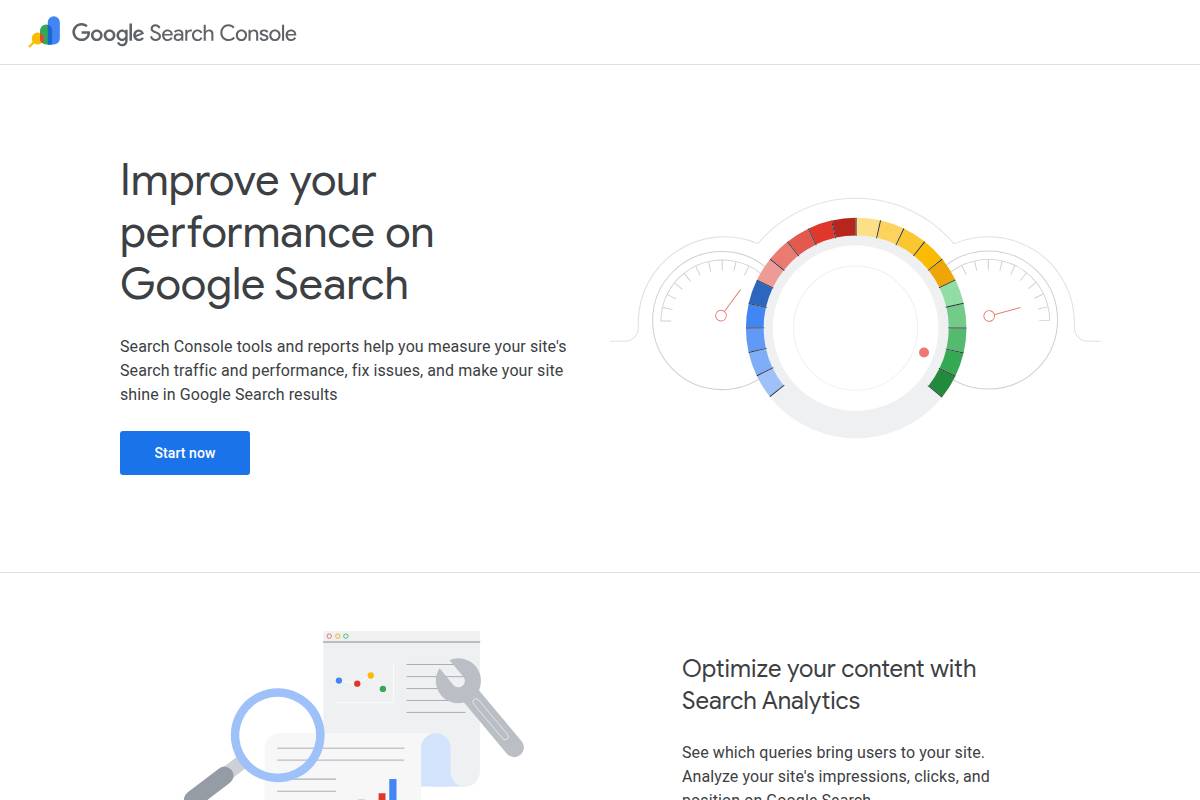
Google Search Console is an essential tool provided by Google that allows webmasters, SEO professionals, and digital marketing agencies to monitor, maintain, and troubleshoot a site's presence in Google Search results. For webmasters and businesses in the United States, especially those focused on maximizing visibility and optimizing website traffic, Search Console offers actionable insights directly from the search engine itself. While designed for both beginners and seasoned SEO specialists, its integrations and reporting capabilities are critical for tracking website performance and resolving technical SEO issues.
About
Google Search Console offers a comprehensive dashboard that displays how Google views your website. It acts as a communication channel between your site and Google's search algorithms, giving you valuable feedback on indexing status, errors, and search performance. Business owners and webmasters rely on it for diagnostic insights and continual optimization of their websites.
Technical Requirements
Getting started with Google Search Console requires only a Google account and ownership verification of your website via DNS record, HTML file upload, or tag placement. These simple verification methods ensure that only authorized users can access critical site information and features. There are no special software needs, making it widely accessible to digital marketing agencies of all sizes.
How It Compares to Other Tools
Unlike third-party SEO suites, Google Search Console provides direct, real-time data from Google’s search index. While platforms like SEMrush or Ahrefs focus on competitive analysis and broader keyword data, Search Console excels at delivering granular data and alerting you to issues as soon as they are detected by Google. Many SEO professionals integrate Search Console data into their broader SEO stack for holistic insights.
Getting Started Tips
To leverage Google Search Console effectively, start by verifying your domain ownership and submitting your XML sitemap. Regularly review the Coverage and Performance reports to identify indexing issues or traffic shifts. Digital agencies often create workflows around resolving flagged errors and monitoring CTRs to maximize client ROI.
Key Features
- Search Analytics for detailed performance metrics across queries and pages.
- Crawl reports to identify and fix indexing issues affecting visibility.
- Mobile usability tracking to ensure your site meets mobile-friendly standards.
- Sitemap submission and status reporting for improved site indexing.
- Manual actions and security alerts to protect site integrity.
Pros
- Free access to official Google search data and notifications.
- Pinpoints site-specific technical issues for rapid resolution.
- User-friendly interface suitable for both novices and advanced users.
Cons
- Limited competitive analysis features compared to robust SEO platforms.
- Data in some reports is delayed by several days.
- Lacks keyword suggestion and backlink tracking functionalities found elsewhere.
Pricing
Google Search Console is entirely free to use for all users. Unlike many SEO tools that charge monthly fees, Search Console delivers its suite of features at no cost, making it an optimal foundation for businesses of any size, including affiliate marketers and agencies expanding their SEO toolkit.
User Sentiment
Among SEO professionals and business owners, Google Search Console is highly regarded for its reliability and direct connection to Google’s search engine. Agencies enjoy its transparency and depth, while webmasters value the actionable advice on site health. Case studies frequently illustrate improvements in traffic and issue resolution after consistent use of Search Console insights.
Further Read: https://search.google.com/search-console/about
9. SpyFu
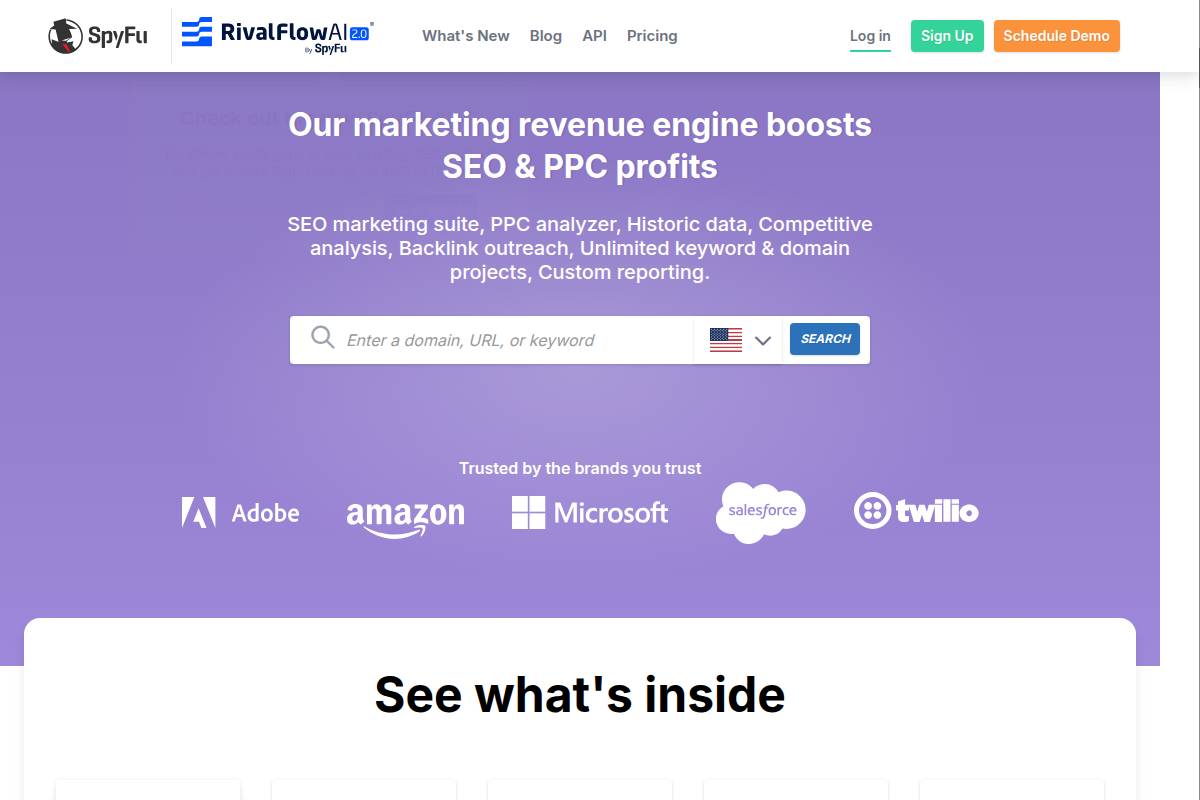
SpyFu is a widely recognized SEO and competitive intelligence tool designed to assist businesses, SEO professionals, and agencies in enhancing their search marketing efforts. With powerful data mining capabilities, SpyFu allows users to analyze competitors, discover profitable keywords, and monitor search engine rankings. It's particularly valued by digital marketing agencies, affiliate marketers, and business owners aiming to outperform their rivals in organic and paid search strategies.
About
SpyFu specializes in providing in-depth keyword and competitor research for Google Ads and organic search. It collects and aggregates historical data, offering a lens into the strategies that work or fail for competitors. Whether you're a small business or an enterprise-level agency, SpyFu is structured to turn raw data into actionable marketing opportunities.
Technical Requirements
SpyFu is a cloud-based solution, so users only need internet access and a modern web browser to utilize its suite of tools. No additional software installation is necessary. High-speed internet is recommended for the best experience, especially when downloading large data reports or performing complex analyses.
How It Compares to Other Tools
SpyFu stands out for its straightforward interface and granular competitive data, often offering more historical PPC data than competitors like SEMrush or Ahrefs. While those platforms may provide broader site audit features, SpyFu is prized for its deep-dives into PPC strategies and backlink intelligence. Many users compliment SpyFu's pricing structure compared to similar tools, making it accessible for both small businesses and larger agencies.
Getting Started Tips
If you're new to SpyFu, begin by entering your own domain as well as a few competitors into the main dashboard. Explore the "Kombat" comparison tool to identify keyword gaps and opportunities. Regularly export keyword and backlink reports for ongoing campaign optimization and schedule periodic site tracking to monitor results over time.
Key Features
- Comprehensive competitor keyword and PPC analysis
- Historical keyword ranking and ad copy data
- Backlink research and tracking capabilities
- SEO and PPC campaign tracking dashboards
- User-friendly reporting and data export
Pros
- Affordable pricing for extensive keyword and competitor data
- Easy-to-use platform suitable for all experience levels
- Excellent historical PPC insights not always found in rivals
Cons
- Limited site audit and technical SEO features compared to some competitors
- Data accuracy may be lower for smaller or newer websites
- Primarily focused on Google, lacking support for other search engines
Pricing
SpyFu offers several pricing tiers, starting with a basic plan that suits freelancers and small agencies, up to a professional plan with advanced features and unlimited data exports. Plans are typically billed monthly or annually, with discounts for longer commitments. Free trials are available, allowing users to explore core functionalities before subscribing.
User Sentiment
SpyFu enjoys generally positive reviews among SEO agencies and webmasters, with users citing the intuitive interface, cost-effectiveness, and actionable data insights as main draws. Case studies highlight measurable improvements in campaign performance and competitor outranking. However, some users note the platform’s limitations in more technical SEO areas and suggest using it alongside other tools for comprehensive digital marketing efforts.
Further Read: https://www.spyfu.com/
Which SEO Tool Should You Choose? (Final Recommendation)
Choosing the right SEO tool depends on your specific business needs, team size, and digital marketing goals. With so many robust options on the market, it’s essential to match a tool’s capabilities to your workflow, whether you’re managing client accounts, improving your own site rankings, or running affiliate campaigns. Here, we outline which tools are best suited for different types of users and share actionable steps for selection and application.
Best for Agencies Needing All-in-One Solutions
For agencies managing multiple clients and projects, a comprehensive SEO platform can streamline workflows and reporting. Look for scalability, integration capabilities, and detailed analytics dashboards. Assess which features align with your agency’s client management and whether the tool handles bulk requests efficiently.
Ideal for Hands-On Business Owners
Business owners who prefer a direct role in their SEO benefit from tools that are intuitive yet powerful. Simple interfaces and guided recommendations support decision-making without needing advanced expertise. Implement solutions that automate basic tasks while providing actionable insights for ongoing optimization.
Niche Keyword Experts and Technical Marketers
Specialists focused on keyword research and technical audits need platforms with granular data, robust crawling, and advanced reporting. Prioritize granular keyword intelligence, SERP tracking, and site health diagnostics. These tools should enable regular checks, custom reporting, and deep dives into niche opportunities.
Affiliate Marketers’ Go-To Choice
Affiliate marketers require tools that track niche and high-converting keywords, competitor analysis, and backlink assessment. Opt for platforms with affiliate campaign tracking and content gap identification. Evaluate stepwise how these tools highlight hidden opportunities and monitor performance over time.
Local SEO and Multi-Location Businesses
Companies with a local footprint or several locations need specialized local rank tracking, citation building, and review monitoring features. It’s crucial to choose solutions tailored for local search nuances. Consider how these tools automate GMB management and enable consistent local listing accuracy across regions.
Frequently Asked Questions (FAQ)
The SEO landscape is continually evolving, presenting new challenges and opportunities for professionals, agencies, and business owners. The following FAQs address the most vital considerations when choosing and managing SEO tools in 2025. These insights help Indexly’s audience—including SEO professionals, digital marketing agencies, business owners, webmasters, and affiliate marketers—navigate industry trends and make better technology choices.
What is the best SEO tool for 2025?
Choosing the best SEO tool depends on the specific needs of your business or agency. While major tools such as SEMrush, Ahrefs, and Moz remain leaders, features, accuracy, and integration capabilities are key differentiators. Consider a tool's ability to deliver reliable keywords, audit sites, and provide competitive analysis to help meet your strategic objectives. Many agencies reported significant ranking improvements after selecting a platform that aligned with their campaign goals.
How do I compare top SEO tools for my agency?
Begin by defining your agency's budget, primary SEO requirements, and workflow needs. Next, create a comparison table listing desired features like keyword tracking, backlink analysis, and reporting flexibility. Evaluate each tool through demos or free trials, and consult case studies from similar agencies to understand real-world performance. Agencies often find value by gathering feedback from their SEO teams during trial periods to identify the right long-term fit.
Is there free SEO software good enough for business use?
Free SEO software can provide essential functions, particularly for small businesses with limited resources. Tools like Google Search Console and Ubersuggest offer basic keyword tracking and site health checks. However, these solutions may lack advanced analytics, data depth, or integration with other platforms—elements often needed for growing businesses. Startups frequently use free tools for initial audits before upgrading as their website requirements mature.
How important is integrating multiple SEO tools?
Integrating several SEO platforms can enhance data accuracy and workflow efficiency. A unified dashboard has allowed agencies to save hours on reporting by synchronizing insights from audit, content, and backlink tools. Start by selecting tools with strong API support and pre-built integrations. Then, map your workflows and set up data flows between platforms. Case studies from multi-channel agencies highlight efficiency gains through custom integrations across their tool stack.
What features should digital marketing agencies prioritize?
Digital marketing agencies should look for SEO tools with robust reporting, competitor analysis, and site auditing capabilities. Prioritize features that enhance collaboration—like project management, permissions, and automated alerts. Agencies that selected tools focusing on campaign management and integration with CRM software experienced improved client retention rates. Focus on features aligning with your agency’s service offerings to deliver more value to clients.


